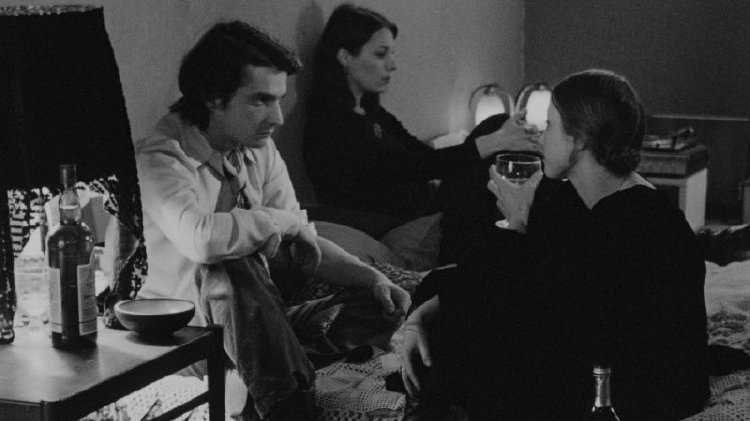The Mother and the Whore

Fifty years ago, after the revelations of the French New Wave and the Parisian unrest of May ’68, filmmaker Jean Eustache created a fictionalized account of his own open relationship with two very different women to examine power dynamics in an age of shifting morality in “The Mother and the Whore.”
Laura's Review: B+
Janus Films has put together an all-encompassing Eustache retrospective as ‘The Dirty Stories of Jean Eustache,’ and, having sampled his first two narrative shorts and his magnum opus, this is a filmmaker whose b&w photography sends you back in time in amongst the crowds on the streets of Paris where pairs of unemployed young men either outright steal from or sponge off of the young women they hit on. “The Mother and the Whore’s” Alexandre (Jean-Pierre Léaud, "The 400 Blows") isn’t quite the degenerate seen in “Robinson’s Place” or “Santa Claus Has Blue Eyes,” but his best friend (Jacques Renard) does steal a wheelchair from a disabled person.
The 219 minute film can be surprisingly funny, especially in its early goings as Alexandre tries to impress several different women. After leaving the mattress on the floor he shares with his older live-in girlfriend Marie (Bernadette Lafont, "Les Bonnes Femmes"), Alexandre seeks out ex-girlfriend Gilberte (Isabelle Weingarten, "The State of Things") and tries to convince her that if she loved her current boyfriend, she’d have married him and so therefore should marry Alexandre. Gilberte is noncommittal. On his way home, Alexandre spies Veronika (Françoise Lebrun, recently so heartbreaking in Gaspar Noé's "Vortex," but rather dour here) sitting at Deux Magots, the café he visits daily to read a newspaper, an activity he equates to having a job, and races after her to get her phone number. Back at home, he brags about this conquest to Marie, who clearly isn’t thrilled yet loves him despite the fact that he uses her (notably Alexandre will become petulantly jealous when Marie spends time with another man). Later Alexandre will note – unironically - to his friend that women used to be impressed by soldiers’ uniforms, but now are impressed by sports cars and businessmen, a shift from patriotism to consumerism.
After Veronika stands him up for their first date, Alexandre regales her with a silly soliloquy on lemonade, tells her her not having shown up the last time gives him something to talk about this time, then informs her he’s only attracted to women for their looks or if they are the wife of a man he admires (trophies!). But Veronika, a nurse who lives in a self-described shabby room at the hospital where she works, isn’t much better, spending her time drinking and indiscriminately picking up men. Eventually Alexandre will invite Veronika to have dinner with Marie. It doesn’t go well, but eventually a ménage à trois forms, the two women growing close, but the dynamic will shift once more, the film concluding on multiple bleak notes as Marie attempts suicide and Veronika vomits.
Alexandre has trysts with other women too, like a friend from school he runs into, but Eustache’s film has other things on its mind in addition to the shifting morals of shiftless men and the women who love them in an age of disillusionment. There is a continual reference to cinema, Alexandre noting Michel Simon, Nicholas Ray and Robert Bresson. His description of F.W. Murnau’s films being those that move from day to night and country to city is reflected in a meal at a railway café. The film has no score, but a turntable behind Marie’s mattress is prominent, although the music Alexandre chooses is often kitschy French pop rather than any revolutionary type of rock.
While some films are capable of enrapturing an audience through an exceptional running time, “The Mother and the Whore” does begin to wear out its welcome as it launches into its final hour, its characters succumbing to despair, Veronika’s soliloquy a dark slog. But Eustache’s first feature film (he only made two narrative features) stands out for its cynical take on a world that in all other ways is typically French.
Robin's Review: C+
"The Mother and the Whore" is included in The Dirty Stories of Jean Eustache retrospective being issued by Janus Films. Click here for play dates for the film and here for information on the retrospective.

